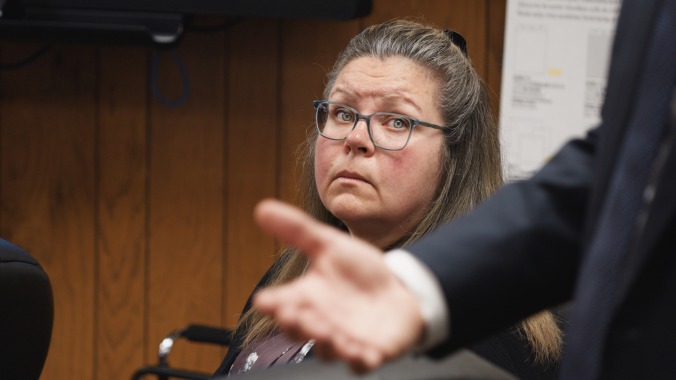‘Baby Doe’ Is an Unflinching Look at a Devastating Case of Denied Pregnancy
"I think it's really hard for people to understand that a woman could not know she's pregnant, but it does happen," the documentary's director, Jessica Earnshaw, told Jezebel.
Photo: SXSW EntertainmentMovies
In June 2019, Gail Eastwood-Ritchey was arrested at her home in Euclid, Ohio. When police arrived and asked the 49-year-old mother and grandmother if she knew why they were there, she responded: “a baby that was left.”
That’s the first of many startling confessions in Baby Doe, a new documentary that premiered earlier this month at SXSW and that chronicles the fallout of a decision Eastwood-Ritchey made 26 years earlier. Director Jessica Earnshaw uses Eastwood-Ritchey’s story to explain “denied pregnancy,” a phenomenon that the National Library of Medicine acknowledges as a “pathological issue”—the condition can be “a consequence of trauma, the wish to not have a child, or a psychiatric problem,” though some studies also acknowledge that it can have non-psychological causes.
In 1993, Eastwood-Ritchey left her newborn in the woods outside the Cleveland suburb where she lived. Paralyzed by the thought of being rejected by her then-boyfriend, Mark; her family; and her friends, she didn’t register the pregnancy until the baby was born. Over two decades later, the conservative, ostensibly pro-life tenets of her community would lead to her arrest and a life sentence in prison, costing her everything.
“She really desperately wanted help, but just didn’t know how to ask for it,” Earnshaw told Jezebel. “And for me coming into the story, what struck me is thinking about a girl having nobody to talk to and being pregnant. That, to me, felt like the heartbreaking story.”
The term Denied Pregnancy, or pregnancy-negation syndrome, was first used in the 17th century by French gynecologist François Mauriceau, who suggested that some women were unaware of their pregnancy due to continued vaginal bleeding. In subsequent years, the definition has expanded and evolved to include pre-existing mental diagnoses, like trauma and depression.
“It’s not in the DSM (Diagnostic and Statistical Manual of Mental Disorders), but the reverse—a woman who actually thinks she’s pregnant, but there’s no baby there—is,” Earnshaw told Jezebel. “I think it’s really hard for people to understand that a woman could not know she’s pregnant, but it does happen.”
There have been a handful of high-profile cases in which denied pregnancy was argued as a defense, though not successfully. In 2022, Theresa Bentaas told the court she didn’t know she was pregnant until the baby was born and discovered he wasn’t breathing; Bentaas was sentenced to 10 years in prison. In 2024, Melissa Jean Allen Avila claimed she didn’t realize she was pregnant until she gave birth to what she thought was a deceased infant that she left in a dumpster when she was 19; Avila was sentenced to 16 years in prison. And in 2016, Emile Weaver delivered a baby inside the Delta Gamma Theta sorority house at Muskingum University after months of denial; Weaver was initially sentenced to life in prison but was resentenced in 2023.
-

-

-

-

-

-

-

-

-

-

-

-

-

-

-

-

-

-

-

-

-

-

-

-

-

-

-

-

-

-

-

-

-

-

-

-

-

-

-

-








































